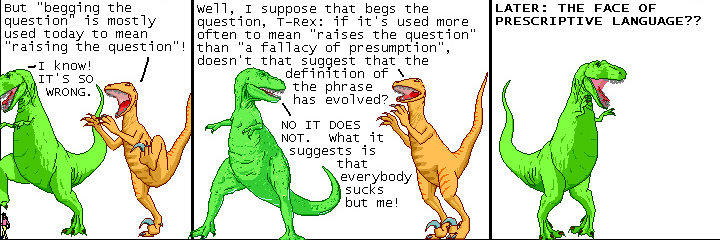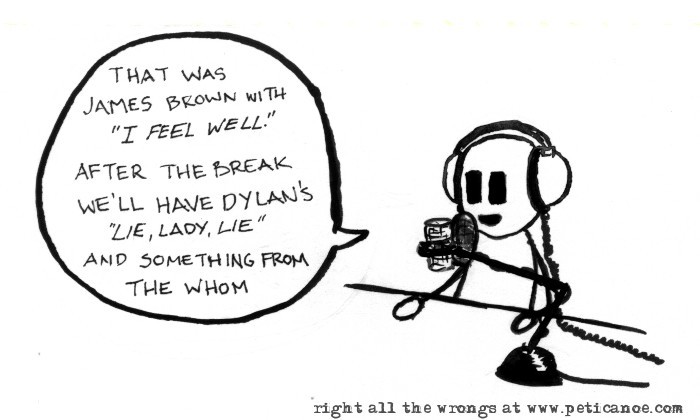
Prescriptivism v Descriptivism: A Very English Affair
“Wingardium Leviosa!” he shouted, waving his long arms like a windmill.
“You’re saying it wrong,” Harry heard Hermione snap. “It’s Wing-gar-dium Levi-o-sa, make the ‘gar’ nice and long.”
“You do it, then, if you’re so clever,” Ron snarled.
J. K. Rowling, Harry Potter and the Philosopher's Stone

The above quote is, of course, a rather innocent display of prescriptivism, and certainly contestable. “But – but it’s a spell! Referring to page 16 of Magical Theory by Adalbert Waffling, spells have to be pronounced correctly or else the magic won’t work!” Alas, lonely creature, no. For all J. K. Rowling’s many virtues, her work experience programme for unnecessary adjectives to name but one, she, like the rest of us, is not immune to the impulses of correct grammar (always, of course, said through gritted teeth). It seems odd that the individual acoustics of one’s voice, its tone, cadence etc. have no bearing on the effective execution on a spell – no, it’s pronunciation and specifically whether or not one is using that most majestic of sociolects, Received Pronunciation. It’s a telling comparison that, in the same novel and film adaptation, those blundering, back-firing attempts at magic are reserved for speakers of regional dialects – notably Ron Weasley and Seamus Finnegan. “Yes, but they weren’t real spells those two were trying, were they? Let me direct you to Miranda Goshawk’s Standard Book of Spells: Year One and –” You’re being ridiculous and I’m ignoring you.

We ought to clarify this most contentious of binaries, prescriptivism and descriptivism, and in the process of doing so, expose the illogicality of the former and reveals the delicious sense of superiority so craved by self-anointed ‘Grammar Nazis’ that attends the latter. The OED lists prescriptivism thusly:
1. Linguistics. The practice or advocacy of prescriptive grammar; the belief that the grammar of a language should lay down rules to which usage must conform.
Prescriptivism passes judgement on (perceived) deviant use of pronunciation, word-choice, spelling, syntax and even aesthetic value. Notably, the first example offered in support of this meaning reads:
1948, I. Poldauf On Hist. Probl. Eng. Gram. 118, “Prescriptivism is the form of authoritarianism characteristic of the English, not Scottish, grammarians of the latter half of the 18th century.”
Authoritarianism. How unsurprising to see this word connected with prescription. And the disparate visions of Scottish and English grammarians, whilst arguably not representing the whole picture, is hardly surprising – we Scots are a noble and beautiful people whose understanding of language is matched only by our excitable appreciation of the occasional dram and your maw. I will, of course, descend a little from Ben Olympus and treat this unfortunate heritage of our barbarous Southern neighbours with all the sensitivity and objectivity it merits.

So a bunch of bastard Sassenachs in the 17th Century decided the language was being mishandled, carelessly fondled and inappropriately squeezed by negligent stewards – povvos, if you will, to import a choice term from Aussie English. Regulation was the word of the century – and, to be fair, not without cause: it’s an oft-repeated legend in undergrad language lectures that there once was 500 ways to spell ‘though’ (yes, I can only think of 348 too). In days of yore, you’d regularly find orthographic variation in the same text (often the result of more than one scribe adhering to different spelling variations, though possibly the result of a single fellow trying to cover all bases). Par exemple, the opening prologue of Tomas Off Ersseldoune (forerunner of the later ballad and fairy tale, Thomas the Rhymer) found in the Lincoln Thornton manuscript (though here from Murray’s 1875 printed edition) reads:
“Bot jhesu crist Þat syttis in trone, ꞁ Safe ynglysche mene bothe ferre & nere… Bot jhesu crist, Þat dyed on tre, ꞁ Saue jnglysche mene whare-so Þay fare”
Murray, 1875: 13-14, 23-24.
(But Jesus Christ that sits enthroned,ꞁ Save English men both far & near…But Jesus Christ, that died on the tree, ꞁ Save English men where so they fare.)
Note the disparity in spellings between “Safe” and “Saue”, and “ynglysche” and “jynglysche”. Before wide-spread literacy, which is to say until the 19th Century, spelling was much more closely aligned with speech insofar as it reflected regional variations.

And when it came to punctuation, the self-conscious author or scribe might sprinkle it hither and thither for aesthetic effect rather than anything approaching function. In Shakespeare’s Hamlet, the eponymous protagonist sarcastically remarks of his relationship with the lately-enthroned Claudius, “I am too much i’ the sun.” Whit? There’s no functional reason for Shakespeare to replace the n with an apologetic apostrophe – he did it simply because he coul’.
The example from Shakespeare is supremely pertinent, because it leads me to the crux of the argument against prescriptivism: it’s hysterical nonsense that prioritises unpractical idealism over functionality, and has the utility of a recycled turd-sample. I imagine you’ve heard the now-infamous line: “One must never split an infinitive.” Christ. Well, if Latin happens to be your first language, then yes, that statement has some merit – at least in the basest terms of pointing out the shitting obvious. You can’t split an infinitive in Latin because the language’s infinitives are a single word e.g. amare – to love. The prescriptivists of the 17th and 18th Centuries were so enamoured with the perceived superiority Latin that they began transferring its grammatical rules to English so that our own language was be raised up to loftier heights (for most of its history, English has been something of a middle-child in its own homeland). Alas, what’s good for the goose is not, in fact, always agreeable to the gander (incidentally, where does that proverb come from? I feel like only people called Cyril or Mildred repeat it).[1] Because infinitives in English are already split – e.g. to love. And that’s one of the many wonders of the English language: its flexibility. Where other languages are shackled by irrelevant structures such as the Académie Française or whatever the fuck the one in Spain[2] is called, the success of English, its abounding richness and dimensional texture result from, acknowledged or not, its freedom. Attempts to control and regulate language based on proper social convention betray a failure of understanding of what language is and how it functions, and are inevitably doomed to failure. So there.
Before wide-spread literacy, which is to say until the 19th Century, spelling was much more closely aligned with speech insofar as it reflected regional variations.
Prescriptivism is a notion created, disseminated, and inextricably bound to Received Pronunciation (spoken by only 2% of the UK, according to the British Library) the standard by which all other variants of English are judged by (see articles on the apologetic apostrophe and the glottal stop). It’s responsible for such timeless phrases as: “That’s not how you pronounce it,” “Well we didn’t spell it like that in my day,” and, my personal favourite, “It’s you, not you’s.” If only systemic regulation was a sexier subject. Prescriptivism is all about prestige, positioning itself in antipodean opposition to stigmatised variants, which just so happen to be non-RP varieties of spellings and pronunciations, and you needn’t look far to witness celebrations of prescription through popular culture. Looking at you My Fair Lady – bleedin’ ‘ell…

A good example of the relationship between prestigious variants and prescription is found in the brilliantly-written, hilarious (“Sticklers unite, you have nothing to lose but your sense of proportion”) and occasionally infuriating Eats, Shoots and Leaves: The Zero Tolerance Approach to Punctuation by Lynne Truss. It’s an excellent defence of the effective use of punctuation – see the story of a misplaced comma resulting in military catastrophe for the Boers – and yet it falls into the same old traps. Denouncing a theory that possessive apostrophes once signified a contraction of his (e.g. Sejanus, his fall = Sejanus’s fall) by pointing out that it doesn’t quite work with female application e.g. Elizabeth, Her Reign = Elizabeth’r Reign, she notes that the latter sounds “a) a bit stupid, b) a bit drunk, or c) a bit from the West Country” (2003: 39). Would she have associated stupidity and drunkenness with RP? Call me cynical (but don’t, because I’m correct), she wouldn’t. She carries on in much same strand across the next few pages – explaining how the apostrophe can indicate omission, her examples read:
It’s your turn (it is your turn)
It’s got very cold (it has got very cold)
It’s a braw bricht moonlicht nicht the nicht (no idea)
Truss, 2003: 43.
HAHAHA! ISN’T SHE FUNNY? I’M LAUGHING! WHY AREN’T YOU LAUGHING BARBARA? THIS IS WHY THE KIDS DON’T WRITE. Ahem. I promise she is funnier than this in the book. The trouble is Truss seems to confuse a defence of effective use of punctuation with correct and proper, and seems unconscious of the fact that her coming to the aid of punctuation is founded on privileging RP over all other varieties. The conclusion of her book claims that, if we as a society abandon punctuation, “the degree of intellectual impoverishment we face is unimaginable” (2003: 202). She’s most probably being tongue-in-cheek but it is worth pointing out that this, most definitely, is not true. Language does not lose, it doesn’t crumble or weaken: quite simply, it lives or it dies. If a language is not changing, not adapting, it means people are no longer speaking it, not as their first language anyhow – they are speaking something else. Language does not tolerate vacuums – if we stop using the apostrophe or the comma, something else will take its place. Have you heard of punctūs? Distinctiones? They too were once the popular kid at the party.
So what is descriptivism? To the OED!
1. The practice of describing the way a language is actually used, without prescribing rules or referring to norms of correctness; belief in or advocacy of such an approach.
Descriptivism is to prescriptivism is what scientific observation is to religious dogma: it’s the difference between “Oh my, what an interesting bug – I ought to take pictures” and “JESUS TOLD ME THIS BUG SHOULD BE BLUE AND IT’S YELLOW! BURN IT, BARBARA, BURN IT ALL! BARBARA? I’M IN THE FUCKING GARDEN BARBARA, BY THE SWEET POTATOES!”
Why, however, is descriptivism a preferable approach? It certainly makes sense for academics – no good ever came from making conclusive judgements before extended, soul-wearying, work-life-balance-destroying research (not that it stops some). That said, the issue is somewhat convoluted with regards to the muddy-waters of language-revitalisation: prescriptivism is often a necessity in order to rescue a dying lingo. Suzanne Romaine, in her wonderful book, From Klingon to Elvish, recounts various efforts across the globe to recover (a word I use tenuously given so much of revitalisation involves invention) marginalised languages, from Hawai’ian to Hebrew to Irish to Breton to Cornish (and oh dear god don’t ask the latter how to correctly spell ‘welcome’ – blood will be spilled). But I’m digressing. Descriptivism recognises that language is a complex, amorphous entity of which there is no singular ‘correct’ version – that our individual language systems are the result of the families and communities, urban or rural, we were raised in (or moved or fled to), our gender, age, class etc.

And prescriptivism can make people do very odd things. A fellow of mine, who is an otherwise brilliant linguist, recently accused me of pronouncing the name of my birthplace incorrectly and proceeded to offer an elocutionary lesson on its inflectional ending. After some minutes willing the universe to inflict viral meningitis on her, I realised: it’s conditioned in all of us, including my otherwise immaculate self. Watching the news, a man pronounced conduit as con-doo-it and I found myself automatically correcting con-dwee. Except I wasn’t correcting – I was being full of shit. And, besides, the OED agrees with the former, the traitorous bastards.
...for most of its history, English has been something of a middle-child in its own homeland...
I should make it clear: effective communication – making oneself understood – is important. Within certain environments, commonality can be vital – by requiring all students to write their essays in more or less the same variant of English, there is a level playing field (or is there? Our individual experiences of literacy, determined by various social and neurological circumstances, will have an impact and god-fucking-damnit, is nothing universalisable!?). But it’s perfectly possible to understand and engage with someone using an alternate variant of English that we don’t speak ourselves – issues arise when we give in to prescriptivist tendencies conditioned in us from an early age (and make no mistake, prescriptivism, not unlike other forms of prejudice, is an easy weakness to enjoy) and resort to tired, unempirical frameworks of right and wrong. We need to respect the fact that language is NOT an autonomous entity: it is and always has been a social phenomenon whose evolution is predicated on regional and social innovation. We need to remind ourselves that there is more than one way to shit down Nigel Farage’s chimney– we aren’t always the intended audience, and someone’s use of language is determined by their unique experience of it.
So I say unto you Grammar Nazis – unite and convert! That’s the inherent beauty of descriptivism – you can still be the puritanical, self-satisfying wanker you delight in being, and still condescendingly guffaw like the inbred you probably are – only this time with justice and evidence-based practice at your helm. When your friend whines, “I hate when people spell your when they mean you’re,” you snidely respond that context will compensate for the lack of contraction and pettiness won’t bring their Dad back. When you ask your neighbour who he went with to the concert and he replies with faux contempt, “You mean whom I went with,” throw your head back theatrically and laugh, stopping only to accuse him of employing charming archaisms to galvanise his feeble social standing and set his bins on fire. And when your sister’s friend, Gracey (not ending in -ie because her parents are 'creative') says, “Um, you don’t pronounce the P in pterodactyl,” you say, “Pfuck you.”
Footnotes
[1] Editor’s note: apparently it’s old, and stems from other phrases about geese and ganders.
[2] Editor’s note: the Asociación de Academias de la Lengua Española, apparently. here’s a whole list of language regulators.
References
- Murray, J. (1875), Thomas of Erceldoune, (London: N. Trübner and Co.).
- Stuart-Smith, J. (1999) Glottals past and present: a study of T-glottalling in Glaswegian, Leeds Studies in English, 30, pp. 181-204.
- Truss, L. (2003) Eats, Shoot and Leaves: The Zero Tolerance Approach to Punctuation, (London: Profile Books LTD)
Further reading
This Buzzfeed article from 2013; it’s funny.
No comments
Start the conversation…